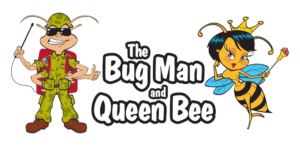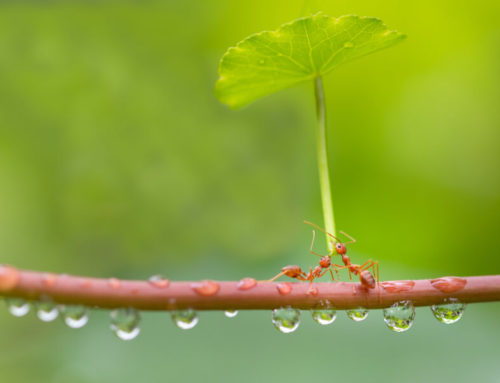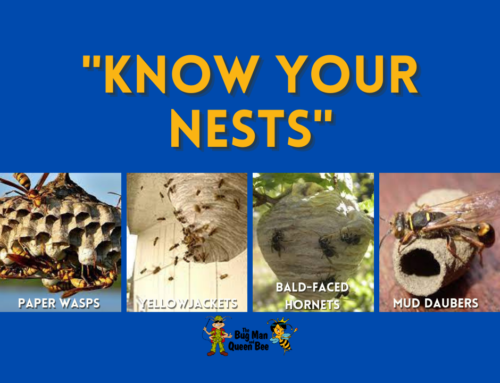Lots of different kinds of insects overwinter in different ways. Some go into a type of hibernation while others find a warm spot to hang out during the winter months (stink bugs, we’re looking at you). While many types of bees and wasps die when the weather cools down, honeybees can survive. They have a developed a unique behavior that keeps them safe from the cold and feed off the honey that they made during the warmer months.
When is it too cold for bees and wasps?
Honeybees are cold-blooded so they cannot survive if their body temperature reaches below 45° F. You will be unlikely to see any honeybees flying around in temps below 55° F but some other bees, like bumblebees, can fly about in colder temps.
Wasps can survive in somewhat colder temps, but they will die off when it freezes (32° F). In most bee and wasp colonies, only the reproductive females (the Queen) will survive through the winter. They find warm spots to hibernate and can survive temperatures as low as 5° F. When it is warm out, they find a new place to build the nest and start laying eggs and creating a new colony.
Preparing for Winter
Throughout the entire summer season, honeybees are preparing the hive for winter. Worker bees collect pollen and then feverishly transform it into honey. The Queen bee reproduces as many colony members as possible. The population build-up is extremely important to the survival of the colony. The more bees in a colony the more likely they can withstand freezing temperatures.
The amount of honey produced and the number of workers in the colony are the two most important factors in a healthy colony surviving until Spring. During the winter months, the workers form a cluster to keep warm. They constantly feed on the honey to keep themselves nourished.
Generating Heat
While in the cluster, the honeybees create heat by moving a special muscle in their wings. This same muscle is used to fly, but when they are in the cluster, and they can’t move their wings it generates heat. A single bee can heat her body up to 111 F! When there is a big cluster of bees all doing this movement, the heat generated can keep the colony warm enough to survive freezing temperatures.
Because of the energy needed to move this muscle, these workers must constantly feed. Without access to honey or enough honey in the hive, the colony can die. Without enough workers to generate enough heat, the colony can die. The worker bees are very important!
Some Colonies Don’t Survive
While the system of warming a colony is an amazing evolutionary behavior, it is not guaranteed to keep a colony alive. A deep freeze can kill even the healthiest of colonies. Check out this video as an example of a colony that did not make it through the winter. Despite the beekeepers best efforts, the combination of the cold and a mite infestation devastated this colony and they died. Beekeepers are incredibly important to the survival and revitalization of the bee population. Especially in colder climates that make survival more difficult.
Spring is Coming!
While honeybees are keeping warm in the cold weather, other wasp colonies die off except for the Queen. Once the weather starts to get warmer, all of the Queens will start to stir and seek out a place to build a new colony. It is this time of year that it is important to protect your home against the emerging Queens. If you don’t want wasps living in the peaks and eaves of your house, it is important to get a preventive treatment. The Bug Man and Queen Bee can help you with all your pest control needs. We Guarantee It! Read more about our Stinging Insect Nest Prevention Service and then give us a call to schedule an appointment to protect your home.


